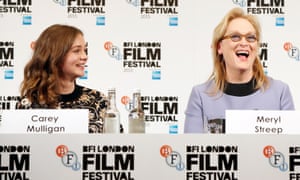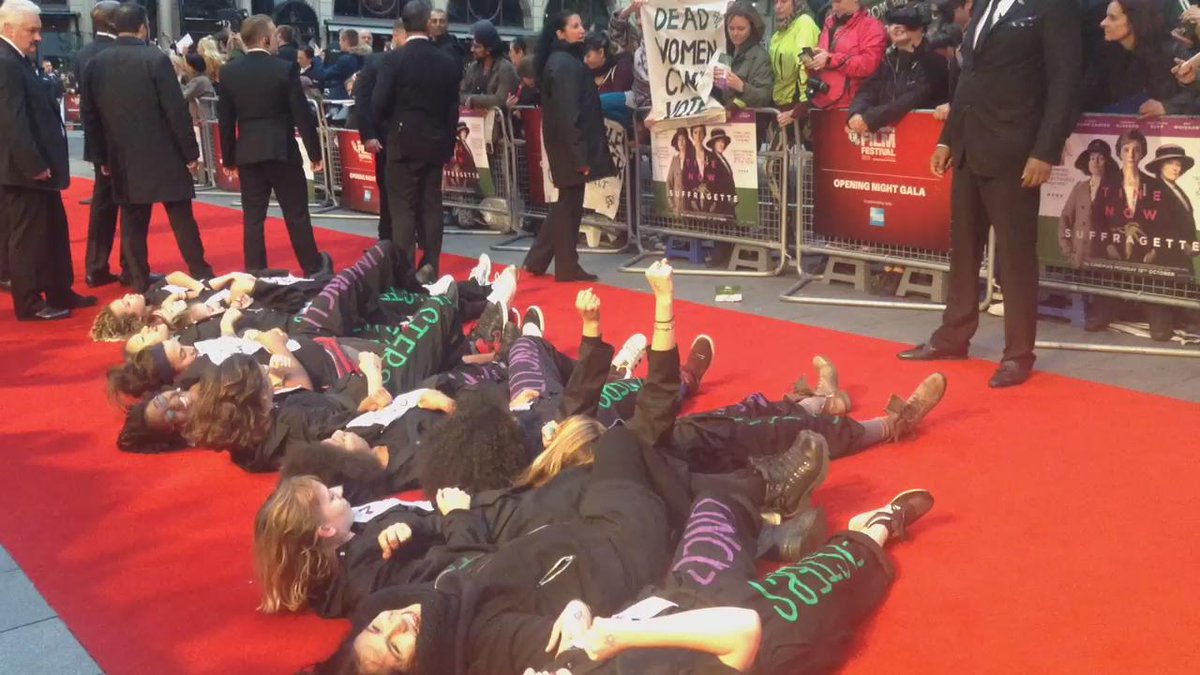http://www.theguardian.com/film/2015/oct/07/suffragette-london-film-festival-meryl-streep-carey-mulligan
Meryl Streep defends feminist credentials as Suffragette opens London film festival
Planned protest and controversy over untactful tie-in t-shirts are backdrop for gala screening of film telling story of the campaign to secure women the vote
 ‘We need inclusion. It has to be equal’ … Carey Mulligan and Meryl Streep at the Suffragette press conference. Photograph: John Phillips/Getty Images for BFI
‘We need inclusion. It has to be equal’ … Carey Mulligan and Meryl Streep at the Suffragette press conference. Photograph: John Phillips/Getty Images for BFISuffragette review – a valuable, vital film about how human rights are won
The London film festival opens with the European premiere of Sarah Gavron’s suspenseful tale of fighters from opposing sides of the class divide starring Carey Mulligan and Meryl Streep
Read more
It has taken a decade to get off the ground, but as Suffragette received its UK premiere as the opening film of the London film festival, the film’s director revealed that she was determined not to be knocked off course in her quest to make her 10-year “passion project”. “A film is never easy,” said Sarah Gavron, “but this was a tough proposition because we wanted to stick to our guns. We pushed through all the obstacles.”
Gavron was speaking at a press conference before Suffragette’s gala screening in London’s Leicester Square, and scriptwriter Abi Morganadded: “A film that is fronted by an ensemble of women, and they are not being funny or romantic, is hard. That became a huge obstacle.”
Suffragette tells the story of the militant campaign in support of women’s voting rights in the UK, and features Carey Mulligan – who appeared at the press conference only three weeks after the birth of her first child - as a laundress called Maud Watts, a fictional working-class character whose struggle is the centre of the drama. Suffragette also features Meryl Streep as Emmeline Pankhurst, Natalie Press as Emily Davison, the activist who died at the 1913 Epsom Derby; andHelena Bonham Carter as Edith Ellyn, an amalgamation of more than one prominent suffragette.

FacebookTwitterPinterest Streep and Mulligan with Sarah Gavron and Abi Morgan. Photograph: LEON NEAL/AFP/Getty Images
The film-makers explained their decision to focus on a peripheral figure in the suffragette struggle, and a fictional one at that. Streep said: “The great achievement of the film is that it’s not about women of a certain class; it’s about a working girl, a young laundress, who looks like us, and the circumstances of her life were out of her hands, completely.” Mulligan, whose character joins the suffragettes’ campaign after years of toil in a laundry, suggested that this focus meant that it was more relevant to contemporary audiences than a straight historical biopic. “It doesn’t feel like a documentary about the past, it feels like a film about today. I always felt it’s resonance was about where we are now, and its achievement is to mark what these women did, and what they gave to us. Of course, we still live in a sexist society, but the film allows us to look at where we are today.”
However, despite the film’s positive message about female empowerment – inside the film industry, as well as in the wider world – Suffragette has found itselfdogged by an unexpected furore over T-shirts the cast wore for a magazine photo-shoot –bearing the words “I’d rather be a rebel than a slave” – taken from a line Pankhurst says in the film, at which some African-American commentators took offence, suggesting the contribution of non-white campaigners was being ignored. Morgan addressed the controversy by saying: “It would be a pity if the negative connotations of that conversation – and it is an important conversation – overshadowed the true and sincere intentions of the film, which is to empower all women, globally, to look for equality for all women. That to me is the really important narrative. But the discourse is really important, and it is vital we keep talking about it.”
Streep also responded to questions over her refusal to describe herself as a “feminist” in a recent interview. “There is a phrase in the film – ‘Deeds not words’ – and that is where I stand on that. I let the actions of my life stand for what I am, as a human being. Contend with that, not the words.”
The film’s status as something of a political hot potato was reinforced by the declaration of activist group Sisters Uncut to stage a protest at the premiere event against cuts to domestic violence services.
 — Emma Jones (@EmmaPJones)October 7, 2015
— Emma Jones (@EmmaPJones)October 7, 2015#suffragette premiere just decided to ignore protesters. V British. All v polite#deadwomencantvote pic.twitter.com/RRGJCS4M3j
Having described this year’s edition of the London film festival as “the year of strong women”, festival director Clare Stewart said that Suffragette “first and foremost, tells an important story made by British women”, and that given the commitment to diversity by the British Film Institute, the festival’s parent body, giving the film the opening slot felt “entirely appropriate”. She said: “The issue over gender equality, especially in the film industry, has become an increasingly important one. It’s clear there is talent everywhere, but not a lot of opportunity.”
In accordance with its powerful themes of gender struggle, empowerment and solidarity, the production has also made much of its female-dominated creative team, led by director Gavron (previously best known for the film adaptation of Monica Ali’s Brick Lane) and scriptwriter Morgan, whose film work includes The Iron Lady, Shame and The Invisible Woman. Gavron said that the cast and crew had formed “an immediate bond”. “There was an unusual sense of camaraderie,” she said. “Partly it was because we were telling a story everybody felt very passionate about, but also because there was an unusual balance: we had men, and we had women, in key positions, and that was exciting.”
However, Streep did have harsh words for forces in the film world that she considered negatively influenced audiences’ appreciation of films that might appeal to women. Saying she wanted to investigate “buzz”, and how people decided which films to see, Streep cited the reviews aggregator site Rotten Tomatoes for its skewed gender balance, saying she tabulated 168 women critics and bloggers on the site, as opposed to some 760 men. “If the Tomatometer is tilted so completely to one set of tastes, it affects box office, absolutely... the word isn’t ‘disheartening’, it’s ‘infuriating’. Because people accept this as received wisdom. It isn’t fair. We need inclusion. It has to be equal.”
No comments:
Post a Comment